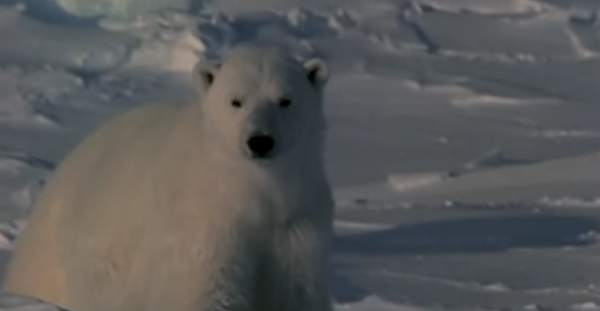By Vishal Goel, | March 15, 2017
- PREV
- Image1of0
- NEXT

The aim of the study was to separate man-made and natural influences on the Arctic Ocean, thereby indicating that the ice-free Arctic Ocean could be delayed if nature swings back to a cooler mode. (Youtube)
According to scientists, natural variations in the Arctic climate have caused up to half of the losses of sea ice around the North Pole in recent decades, with the rest driven by man-made global warming. The aim of the study was to separate man-made and natural influences on the Arctic Ocean.
Like Us on Facebook
According to the study, an ice-free Arctic Ocean, often feared to be just years away, could be delayed if nature swings back to a cooler mode.
The US-based team of scientists wrote in the journal Nature Climate Change that the natural variations in the Arctic climate "may be responsible for about thirty to fifty percent of the overall decline in September sea ice since 1979. The ice has been shrinking steadily and had hit a record low in September 2012 (late summer in the Arctic) in satellite records dating back to 1979. The ice is now the smallest in mid-March, rivalling winter lows set in 2016 and 2015.
According to the study, a decades-long natural warming of the Arctic climate could be tied to shifts as far away as the tropical Pacific Ocean. The lead author Qinghua Ding, University of California, Santa Barbara, said that if this natural mode could stop or reverse in the near future, Artic could see a slow-down of the recent fast melting trend, or even a recovery of sea ice. However, in the long term, the build-up of man-made greenhouse gases would become an ever more overwhelming factor, he wrote in an e-mail. Ed Hawkins, at the University of Reading, who was not involved in the study said that it is a matter of when, rather than if, the Arctic will become ice-free in summer.
The melting Arctic is disrupting the livelihoods of indigenous peoples and damaging wildlife such as seals and polar bears while opening the region to more oil and gas, and shipping.
In 2013, a U.N. panel of climate scientists had said that the human influences had "very likely contributed" to the loss of Arctic ice, however, without estimating how much. It was said that the ice could disappear by mid-century if emissions keep rising.
-
Use of Coronavirus Pandemic Drones Raises Privacy Concerns: Drones Spread Fear, Local Officials Say

-
Coronavirus Hampers The Delivery Of Lockheed Martin F-35 Stealth Fighters For 2020

-
Instagram Speeds Up Plans to Add Account Memorialization Feature Due to COVID-19 Deaths

-
NASA: Perseverance Plans to Bring 'Mars Rock' to Earth in 2031

-
600 Dead And 3,000 In The Hospital as Iranians Believed Drinking High-Concentrations of Alcohol Can Cure The Coronavirus

-
600 Dead And 3,000 In The Hospital as Iranians Believed Drinking High-Concentrations of Alcohol Can Cure The Coronavirus

-
COVID-19: Doctors, Nurses Use Virtual Reality to Learn New Skills in Treating Coronavirus Patients











